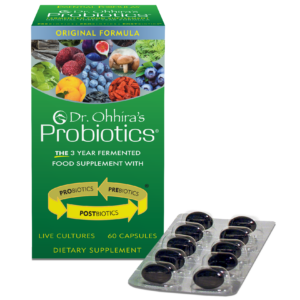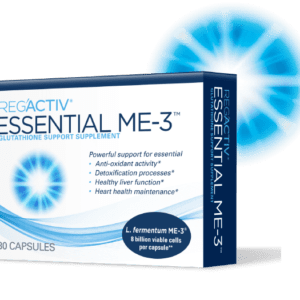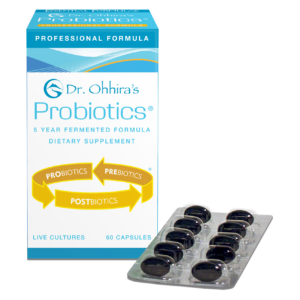Acid reflux can lead to heartburn and general discomfort, and chronic acid reflux may be a sign of gastroesophageal reflux disease (GERD). There are many ways to treat acid reflux, and according to various studies, probiotics are one of them. The right probiotic supplements can actually help control acid reflux symptoms by improving overall gut health.
Gut Health and Acid Reflux
To understand the relationship between gut health and acid reflux, it helps to know how GERD and acid reflux occur in the first place.
Under normal circumstances, the muscle at the base of your esophagus—called the lower esophageal sphincter, or LES—only opens when the muscles in your esophagus force food through during swallowing. However, sometimes the LES relaxes a little too much, allowing stomach acid to flow upward, causing heartburn and gastroesophageal reflux disease (GERD).
Research indicates that there’s another component to GERD and heartburn as well. That component is the microbiome in your esophagus. Your esophagus is home to both helpful and harmful bacteria. When the population of good bacteria is enough to keep harmful bacteria under control, it can help reduce inflammation and disease. An imbalance (or dysbiosis), on the other hand, can lead to increased inflammation, which can actually create conditions leading to GERD and other diseases.
-
 Dr. Ohhira’s® Probiotic Supplements with Original Formula$13.95 – $89.95
Dr. Ohhira’s® Probiotic Supplements with Original Formula$13.95 – $89.95 -
 Reg´Activ® Essential ME-3$39.95
Reg´Activ® Essential ME-3$39.95 -
 Dr. Ohhira’s® Probiotics Professional Formula$39.95 – $129.65
Dr. Ohhira’s® Probiotics Professional Formula$39.95 – $129.65
How Can Probiotics Help With Acid Reflux?
Given the role that the esophageal microbiome (EM) plays in preventing GERD and acid reflux, it follows that since probiotics promote better gut health, they may also help alleviate acid reflux symptoms. A number of studies support this.
Reduced GERD Symptoms
In one review of 12 different studies, probiotics were found to have beneficial effects on GERD symptoms, including reduction in regurgitation, heartburn, dyspepsia, belching, nausea, and abdominal pain. Specifically, lactobacillus and bifidobacterium strains were shown to be effective in reducing symptoms.
In addition, another study found that Bifidobacterium lactis HN019 in particular decreased the frequency of eight out of nine gastrointestinal symptoms. What’s more, no adverse side effects were reported.
Improved Digestion
The same study found that B. lactis HN019 significantly reduced “whole gut transit time,” meaning the time food spends in the digestive system before excretion. One reason behind this is thought to be that probiotics help regulate your stomach’s production of digestive fluids, which improves digestion.
Some types of harmful bacteria have been shown to cause digestive problems. Helicobacter pylori, for instance, is associated with an inhibition of stomach acid production, which can slow digestion and lead to various problems, including solid foods moving further into the gut. Acid reflux is another common result of an H. pylori infection. Fortunately, research shows that probiotics can help eradicate H. pylori when used with standard therapy, reducing GERD symptoms that may result.
Additional Benefits of Probiotics
Additionally, probiotics can help reduce gas buildup, help break down food more, and generally improve your gastrointestinal health. By improving gut health, you can help your body become less prone to acid reflux and heartburn.
What Types of Probiotics Are Best for Acid Reflux and GERD?
Given the benefits probiotics can have on acid reflux and GERD, there remains the question of which ones are best for preventing upper GI problems. As stated above, supplements containing bifidobacterium and lactobacillus strains appear to have a positive effect on GERD symptoms, so the supplement you choose should contain these strains.
In addition, prebiotics—which feed beneficial bacteria—may play an important role in improving upper gastrointestinal health. A study published in 2018 found that 88% of patients who consumed a prebiotic supplement saw improvements in GERD symptoms after two to eight weeks. As such, probiotic supplements that contain prebiotics could be more effective.
Put simply, the ideal probiotic for GERD should have the right varieties of bacteria and the substances needed to feed them.
FAQs on Probiotics for Acid Reflux
Can leaky gut cause acid reflux?
Leaky gut syndrome—which is associated with gut dysbiosis—is often characterized by various gastrointestinal symptoms, including heartburn and acid reflux.
Can probiotics make acid reflux worse?
It’s actually the reverse. Probiotics have been shown to improve acid reflux symptoms, including reducing heartburn.
Is it safe to take probiotics and antacids at the same time?
Yes. Probiotics add beneficial bacteria to the digestive system, while antacids counteract stomach acid. They work on different components of your digestive system, and therefore generally don’t interact.
What’s a good probiotic for GERD?
Dr. Ohhira’s Probiotics supplement can be a highly effective option to add to your overall program if you’re experiencing GERD symptoms. It provides a wide variety of probiotic strains and also includes all natural prebiotic substances as well.
Best Probiotics for Heartburn
If you’re experiencing frequent heartburn due to acid reflux or GERD, an all-natural probiotic supplement can help you regulate your gut’s bacteria and mitigate symptoms. Take a look at Dr. Ohhira’s supplements, or contact Essential Formulas to learn more.






